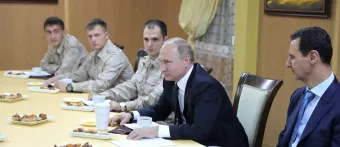Russia’s Increasing Stalemate in Southwest Syria

Russia’s Increasing Stalemate in Southwest Syria
The town and province of Daraa in southwest Syria is known for being a “cradle of the Syrian revolution”. Six years after the start of the Syrian uprising, it has been included in one of the four de-escalation zones that Russia established in Syria striking deals between different opposition armed groups and Damascus, with the consent of external actors. The southwest de-escalation zone is comprised of three provinces – Daraa, al-Suwaida, and al-Quneitra – whose proximity to Israel has been a crucial factor in Moscow’s strategy in the region.
The southwest Syria de-escalation zone has several peculiarities that make it distinct from the other zones, in particular its geography, i.e. its proximity to Israel, which has defined Russia’s very special and nuanced approach to it. At the same time, the Russian approach to dealing with the armed opposition groups within the zone was similar to the groups in other de-escalation zones. So, what makes Russia’s approach different?
The ideas expressed are those of the author not the publisher or the author’s affiliation
Published in October 2020
All rights reserved to GCSP
Part of the Syria Transition Challenges Project
Alexey Khlebnikov is an independent strategic risk consultant and a MENA expert at the Russian International Affairs Council (RIAC). He consulted various institutions and INGOs, including humanitarian ones. He has been published on international relations topics in particular on the MENA region in academic journals and media sources in Russia, Europe, U.S., and the Middle East. He holds an MA in global public policy from the University of Minnesota, Hubert Humphrey School of Public Affairs and a BA and MA in Middle Eastern studies from Lobachevsky State University of Nizhny Novgorod where he also completed his PhD studies. He was an Edmund Muskie fellow (2012-2014) in the U.S., a research fellow at the Johns Hopkins University School of Advanced International Studies (SAIS) in 2013 and a visiting fellow at Tel Aviv University in 2011. Currently Alexey consultants various think tanks, institutions and INGOs in Europe, Middle East, Russia, and the U.S. Alexey's research interest is focused on the regional transformations, conflicts, intra-regional tensions and Russia’s Middle East policy.

